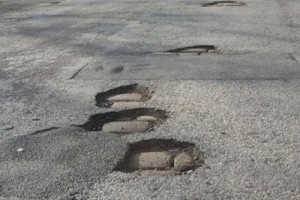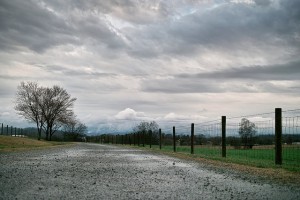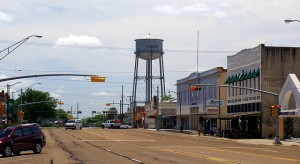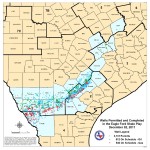Will Gravel Fix Broken Roads in the Eagle Ford Shale?
On a rare rainy day in DeWitt County, Texas, Curtis Afflerbach rumbles down a ragged strip of asphalt in his silver pickup. It’s hazy outside, but he can still make out the oil and gas wells on either side of him. Afflerbach counts them, reaching 12 as he drives the length of narrow road.
Afflerbach grew up in DeWitt County on a farm outside of Cuero. Now, as a County Commissioner, he’s partly responsible for maintaining roads. But that’s been difficult lately. Still driving, Afflerbach starts to point out the enormous pot holes that are scattered seemingly everywhere.
Those oil and gas wells that Afflerbach was counting? They’re the reason for the holes.
DeWitt County is in the eastern part of the Eagle Ford Shale. Some of Texas’ most prolific drilling happens here, and it’s taking its toll on the county’s roads. According to Afflerbach, the constant truck traffic going to and from the wells causes expensive damage to the roads. And they’re almost impossible to fix with his limited resources.
“You work for a while [on a road] and then you have to go somewhere else and work on another road for a little bit because you’re just really not getting anywhere,” he says. “You just try to do what you can when you can.”
But the oil and gas that the trucks move has produced a lot of tax revenue for these counties. Shouldn’t that be enough to cover the expense of new roads?
To this point, it hasn’t. And unless the current system changes, it won’t any time soon.
‘A Free Lunch for the State’
In Texas, severances taxes from mineral extraction go straight to the state’s Rainy Day Fund or the Permanent School Fund. The county that hosts the drilling doesn’t keep a dime.
DeWitt County Judge Daryl Fowler thinks that this arrangement is unfair. He calls it “a free lunch for the state,” since it collects all the severance tax revenue for itself. The individual counties are left to deal with the road damage on their own.
“Not one dollar of [severance tax] has been focused on paying for the damages,” Fowler said. “And we’re left here with an empty bag and paying for the damages to our roads to the tune of hundreds of millions of dollars.”
This past legislative session, Fowler and other leaders from the Eagle Ford Shale lobbied for some of the severance tax to stay in the counties. That didn’t happen.
Instead, lawmakers approved a one-time appropriation of $225 million for roads damaged by the energy boom. But with so many counties vying for that money, Judge Fowler doesn’t think that DeWitt County will see much of it.
Oil companies do maintain some roads in the oil patch. But so far they’ve been unwilling to foot the bill for countywide repairs, and lawmakers have been unwilling to compel them. So what are the counties supposed to do?
Gravel Going Forward?
One option is to grind up the damaged asphalt roads and replace them with gravel. Commissioner Afflerbach does this pretty regularly with his roads, since he lacks the funding to do much else. Plus, gravel includes some benefits that you might not expect.

Photo by flickr user SweetDaddyP
Gravel might be a better alternative than dealing with pot holes like these.
“[Gravel] is a lot easier on your behind than riding down the [damaged road] we just came off of that’s paved,” Afflerbach said. And he’s right, it was.
Gravel roads are also cheaper and easier to maintain according to the Texas Department of Transportation. Without money for full repairs, TXDoT said in August that it would convert 83 miles of damaged farm to market roads to gravel.
Not everyone thinks that’s a good idea. At a recent Texas Transportation Commission hearing, residents of Texas shale drilling regions like Durrell Johnson criticized the plan.
“The bottom line is this: converting these roads from pavement to gravel is a step backwards. No one could deny that, no one could refute it,” said Johnson, “How many times in this great state of Texas have we taken a step backwards?”
Johnson lives on one of the roads slated to be ground up. He and others also said that converting to gravel poses safety hazards to drivers, and causes excessive wear and tear to their vehicles.
In mid-August, TXDoT said that it would delay the plan, but not cancel it. The Senate Select Committee on Transportation will hold a meeting on October 9th to review the issue further. But that might not matter, since TXDot has said that it could start crushing roads as early as October 20th.



